#paraphrased dialoge
Text
How Bruce found out about "Uncle Eddie"
Lawyer: "Your father wanted Edward Drake to raise you."
Tim: *gasp* "I have an uncle? Why didn't dad ever tell me???"
Lawyer: "We're shocked too. Since he travels a lot, we still need to locate him."
Bruce: "Ah. He's the black sheep of the family. No worries, Tim. We'll find him."
Tim: "Thanks, Bruce."
#tim drake#dc comics#dc universe#bruce wayne#this is basically just the paraphrased dialog of what exactly was depicted#i just love how “shocked” tim is and how he let's bruce make his own conclusions#tim is just so fucking smart for the strategy he pulls off to lie to bruce
222 notes
·
View notes
Text
Vor and Kairi are both like "Okay, change is really scary and tbh I'd prefer things to just stay the same, but! I acknowledge that change is inevitable and so I will confront my fears head-on and adapt!" and then they each choose a course of action that falls on an opposite extreme.
Vor leaves her friends (potentially with the intention of it being a permanent separation based on Eraqus' comments), realizing that she won't ever grow as a person as long as she's over-reliant on her friends for comfort, and also realizing that trying to stay by their side forever is a futile effort anyway that'll just cause her pain. To her, "adapting to change" means being willing to change her circumstances, and then hopefully she, too, will change as a result. Vor is prioritizing her personal feelings, desires, and identity at the cost of her relationships, when perhaps a balance would be more ideal.
So Vor's approach is thus: (1. Leaves her friends (2. Changes her circumstances in order to change herself (3. Prioritizes herself over her friends.
Kairi, on the other hand, chases after her friends relentlessly, forever trying to catch up to them, convinced that if she just "gets strong like them", wields a Keyblade like them, fights like them, that she'll no longer be left behind and exploited by the villains all the time. To her, "adapting to change" means being willing to change herself, and then hopefully her circumstances, too, will change as a result. Kairi is prioritizing her relationships (her worth relative to her friends, and her worth to her friends) at the cost of her personal feelings, desires, and identity, when--again--perhaps a balance would be more ideal.
So Kairi's approach is thus: (1. Stays with her friends (2. Changes herself in order to change her circumstances (3. Prioritizes her friends over herself.
Maybe if Vor and Kairi had met (in a theoretical AU scenario, of course) they could have learned something from each other, and found that balance sooner.
#khdr#kingdom hearts dark road#kh vor#rambling about dim path#ch tag: vo#Also it's implied that Vo only became a wielder to follow her friends just like Kai#(Because she seemingly doesn't have a reason for why she became one)#So another similarity between them there#I know Kai wanting to 'get stronger' and fight better could qualify as personal desires but#I don't think fighting was ever something she truly wanted. She just felt like she had to.#In KH 2 one of her NPC dialogs is like (paraphrased) 'It's not fair that you guys get hurt and I don't'#IMO it's a 'wanting to do the right thing' sort of thing#Also feeling like it's the only way forward. The only way to stay with her friends.#If given the choice I think she'd much prefer that they all just went home and got to /stay/ home#And in any case I think she swallows a lot of her true feelings to be 'strong' and not be a burden to her friends#So yeah. Either way. Prioritizing her friends over herself I think!#khdr spoilers
19 notes
·
View notes
Text
Writing Notes: Plot
Rick Riordan's Writing Tips
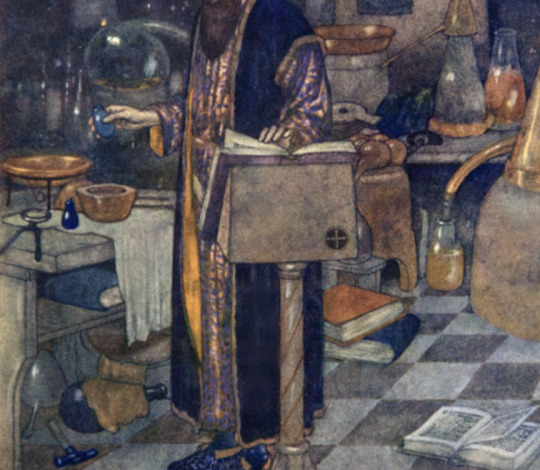
Rick Riordan:
How I craft plot has changed radically over the years. With BIG RED TEQUILA, I did very little plotting in advance. I simply began writing, then went back later and tied up all the loose ends, of which there were plenty. With each successive novel, I've done more outlining in advance. Strangely, this has made writing no easier — it's only made the process harder in different ways.
My attitude about plot and how one develops effective pacing is evolving, but below are five points I stand by:
RICK RIORDAN'S TOP 5 TIPS ON PLOT
Don't write the parts the reader would skip anyway.
I'm paraphrasing the great Elmore Leonard here.
Most readers, from time to time, have skipped over portions of a chapter to get to the "good stuff."
For instance, many readers will skip a long paragraph of description so they can find the next line of dialog.
One trick for keeping the reader's interest is to zoom in on the content they want to see and leave out the rest.
Writers, especially beginning writers, tend to over-explain.
Distinguish between mystery and confusion.
It is good to keep the reader guessing.
It is bad to keep the reader confused.
The key to successful plotting is giving the reader sufficient information to keep them interested and engaged, but not so much information that they no longer care about what will happen next.
The plot should be built in layers of compelling questions –
"What will he do?"
"What is his secret?"
"Why does she hate him so much?"
The reader should always have at least one question in mind, and be dying to find out the answer.
Get going!
Beginning writers tend to believe that they must "set things up" before they get into the real meat of the novel.
They want to introduce characters, history, and setting before they start on the central dilemma.
Chapter one is often limp, because of this.
Even worse, some writers are so hesitant to get to the point in chapter one that they put off the action even further by writing a prologue.
The problem is, until we know the dilemma, we won't care about the set-up. Get to the point!
Often manuscripts are better if they start with chapter 2, as Lawrence Block once rightly pointed out.
Identify the moral dilemma driving the novel.
The successful novel will haunt a reader because it deals with some ethical or moral dilemma that makes the reader wonder what he or she would do in the protagonist's place.
Action may hold a reader for a chapter.
A surface dilemma like a kidnapping or a romance may hold the reader for fifty pages or more, but only a moral dilemma will hold the reader for an entire novel.
The protagonist must exert influence to solve the problem, and the antagonist must exert influence to stop the solution.
The book must be about conscious choices, carried out in active terms.
It must be about conflict.
A book about random events happening to passive people will not be compelling.
Coincidence is taboo – things can't just happen.
There must be a cause and effect.
Source
#rick riordan#plot#writeblr#spilled ink#writing reference#on writing#writing tips#writing advice#literature#writers on tumblr#poets on tumblr#dark academia#writing prompt#poetry#light academia#edmund dulac#writing resources
76 notes
·
View notes
Text
Why do minecraft roleplayers make such good dialog, Foolish saying "oh not only you but everyone better hope that she is there, cause if she is not, everyone on this island will have hell rain down upon them" (bit paraphrased but the feeling is there)
336 notes
·
View notes
Text
Zero vs. Kings
So, I just finished Ace Combat: Zero and the final mission was very good. But after that I played Project Wingman's final mission, and now I have some thoughts I'm gonna say.
(Spoilers Bellow)
First, they are both very good final missions that cap off both games well. But there are some very key differences.
To paraphrase and expand on a thought that I saw else where (probably reddit):
Zero is an honorable duel between two knights set against gently falling snow. The fate of the world is on the line, but your opponent, Pixy, respects you as an equal and a former friend. He is motivated by his ideals and hope for a better world.
Kings on the other hand, Is a knife fight to the death on the roof of a burning building. There is no saving what's bellow you, and the only thing you can do is kill the guy in front of you. Crimson 1 hates you and blames you not only for shooting down his squad-mates, but for the entire war as well as for his own actions (the destruction of Presidia)
They are both accompanied by beautifully fitting tracks for both of their fights. Pixy cycles through three weapons for each phase of the fight, but Crimson 1 gets a new one in his arsenal for each stage completed. But while finishing stage three of Zero brings you to a triumphant victory cutscene, Kings has something different.
Coronation
When you take off the last of Crimson 1's health the music shifts and most elements of the HUD fade away, leaving two health bars at the bottom,
[MONARCH] and
[CRIMSON 1]
Crimson 1's ranting and threats end, replaced by a begging desperation as he tries to keep his aircraft and himself alive long enough to take you down. But by this point he has already lost, and the rest of the fight is merely a formality, a drawn out goodbye. It ends with his last request, "Remember Me", from a pilot we never the name of.
Kings is sort of an antithesis to Zero, an end to a long fight with a bitter victory (that is sweetened a little bit by the secret Mercenary difficulty credits dialog). They are both wonderful endings to their respective games, each adding a final bit of flavor to an already amazing experience.
104 notes
·
View notes
Text
I had a dreeeeaaaammm
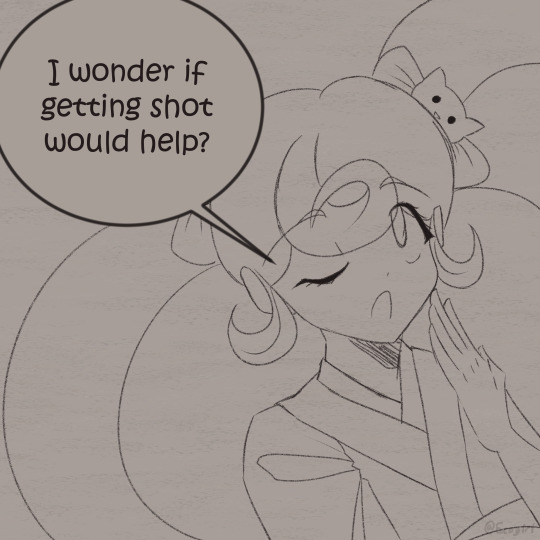

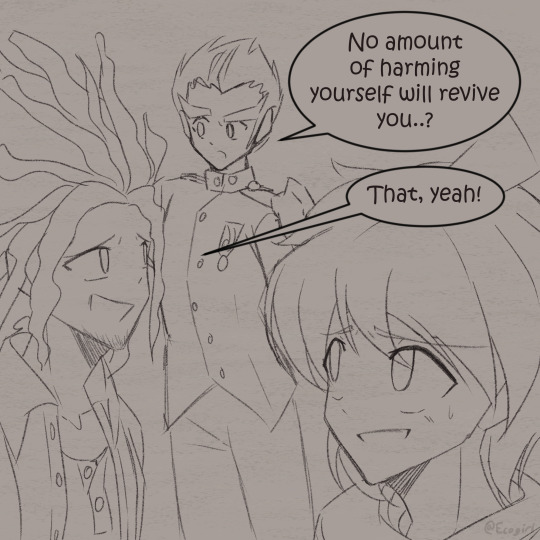

Was too lazy to make these actual pictures lol
Context:
I had a dream last night. It's hard to remember since that was almost 24 hours ago now but here's what I remember:
Ghosts existed.
For some reason, there were ways to come back to life if you ever died and became a ghost. They were really easy, too, I just don't remember how exactly.
Fsr my dream was about DR1 at some point, and I remembered reading this 4 panel comic.
I have no idea why Hiyoko was there. She just was ig lol
The dialog is paraphrased since I don't remember what was said exactly, but it was pretty close to this.
Also don't ask why Taka suddenly has a sweater on in the last panel. I don't know either, that's just what happened lol
#danganronpa#kiyotaka ishimaru#ishimaru kiyotaka#makoto naegi#naegi makoto#yasuhiro hagakure#hagakure yasuhiro#hiyoko saionji#saionji hiyoko#sketch#sketches#digital sketch#digital art#ecogirl#4 panel comic#Idk I think my brain just wants to see more Taka in comfy clothes#\ (ツ) /#I really liked drawing that last panel lol#dr1#dr2
79 notes
·
View notes
Note
WHAT HE DO I CAN'T WATCH IT ATM
(Paraphrasing bc I'm still watching, sorry if I'm not quite correct!)
To everyone's surprise, Orym snuck over to Nana Mori while the Hells slept to make a deal with her.
Specifically, he requested that the Hells would all make it back alive from their mission... and in return he would serve her (with Nana Mori's dialog implying she'd have him help around the house, likely keep him forever).
He specifically tried to be specific to avoid rules backfiring on him, but oh boy do I still think this could get twisted.
(Also the Vax parallels, while said PC is in screaming agony in part due to his service to another fate tender in exchange for the life of someone he loves, are strangling me)
#sidenote/not directed at you anon: but if anyone bitches about the RQ when we now have Mori to compare her to ima l a u g h#critical role spoilers#cr spoilers#critical role
28 notes
·
View notes
Text
Ozzy: My Analysis.
This was a long time coming, because from the very first time I played his route (which also happened to be the first I completed the season to the end with), I knew Ozzy was a fundamentally interesting character that I'd want to dedicate a whole essay for, because it's one way I like to show my affection for these characters 🥺
(Problem was, I felt like I wouldn't of been able to do him justice before, but after my final research run, I don't think that's a road block for me anymore.)
One thing about his route is, no matter how you approach it, there'll always be a level of pain to it. I think the only exception to this is if you tell him, in paraphrase, "I'm interested too, but I'm not ready to commit yet," when he confesses to MC after the Doghouse Challenge, because that option allows MC the best of both worlds.. those two worlds I've experienced first-hand, I'll detail below.
If you tell him "I feel the same way," that day, it'll be held in the back of his mind that, at-least some point in time, he was your #1 choice (even if you end up choosing someone else in the end)
The pain waiting for MC on this path is, of course, how directly affected she is by everything that happened after her shock fake-dumping. (I even liveblogged my reaction to a lot of it, when I consciously paid attention to everything happening outside of Ozzy and MC's bond, within my #my exp tag, early March.)
Him patching things up with Grace, which she revealed to MC during Casa Amor
What he did during Casa, in reaction to seeing MC again in the postcards, (which didn't paint her in a positive light), which was a skinny-dip threeway kiss (which he IMMEDIATELY regretted)
Not breaking things off with Grace as soon as he should've after Casa (in my opinion), which I think should've been that first morning when all the OGs woke up together in the villa again, at the latest
And, on the topic of the Casa drama.. one moment I really like is, even if MC chooses to "play dumb," when piecing together what likely happened.. Ozzy couldn't keep her in the dark for too long even when he first considered it, which to me is so cute 🥺💗
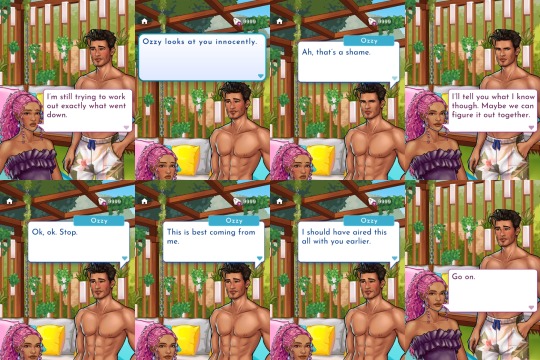
@operationnope brought up some very good points when I asked her opinion on the situation. Being reminded of a very core part of Ozzy's character amidst the hurt was just what I needed 🥴 even if he fumbles along the way, he still wants to do right by all of the involved parties, and that includes Grace.
And, that leads me to what my final research run was all about.. seeing what his route is like when you friendzone him instead, before Casa. And, holy hell. I thought it would've been easy enough, but that came with its own unique set of challenges.
@ariendiel I remember at one point just thinking, "this is probably the closest to the Noah route experience I'll ever feel," and I know y'all Noah stans had it even tougher because there was no way to even couple up with Noah at all, outside of the disaster recoupling 😭 y'all don't get enough credit for REAL 🥺💙
It was a very isolating path, where even Ozzy flips back and forth between acknowledging MC's interest in him after all, with her actions, to "I'm friendzoned" mode. Everyone else, including Grace, just brushes off everything MC does, with the clear exception of the final recoupling.
And that all applies even after I told Grace that it could become a thing still, him and MC together 💀
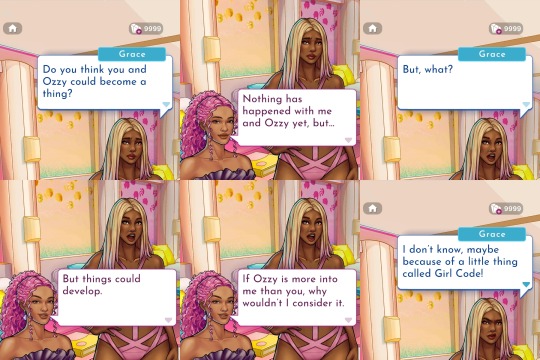
On the one hand, yes I can sympathize with Ozzy's position in this scenario. But also it's like, Ozzy.. read the room! 😭🥺
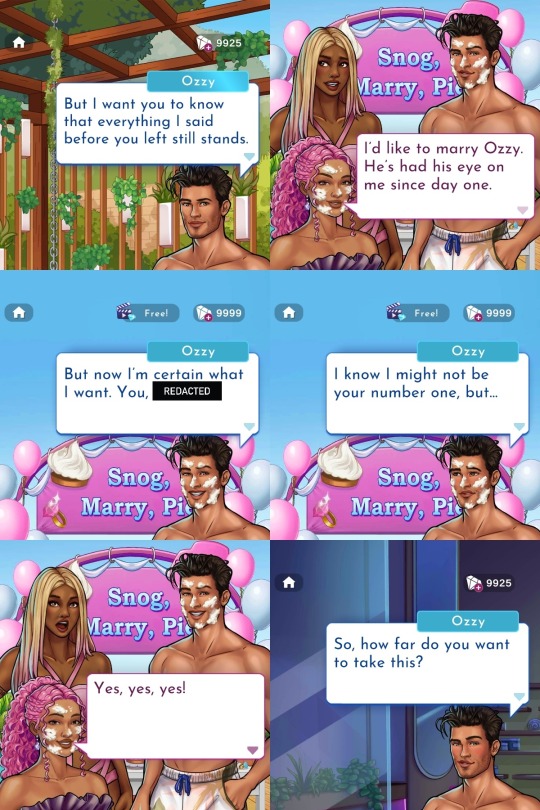


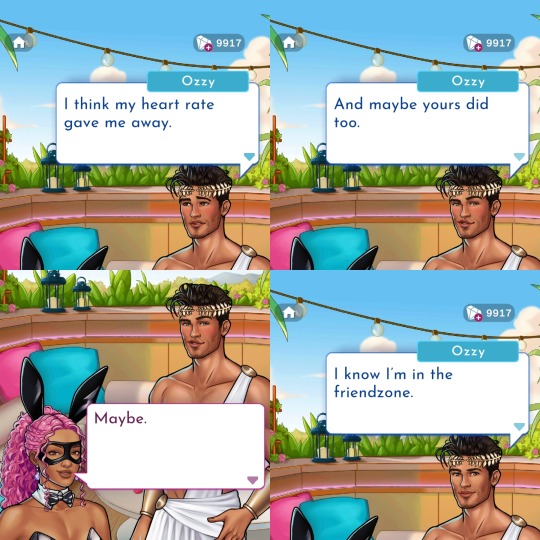
Or, alternatively...
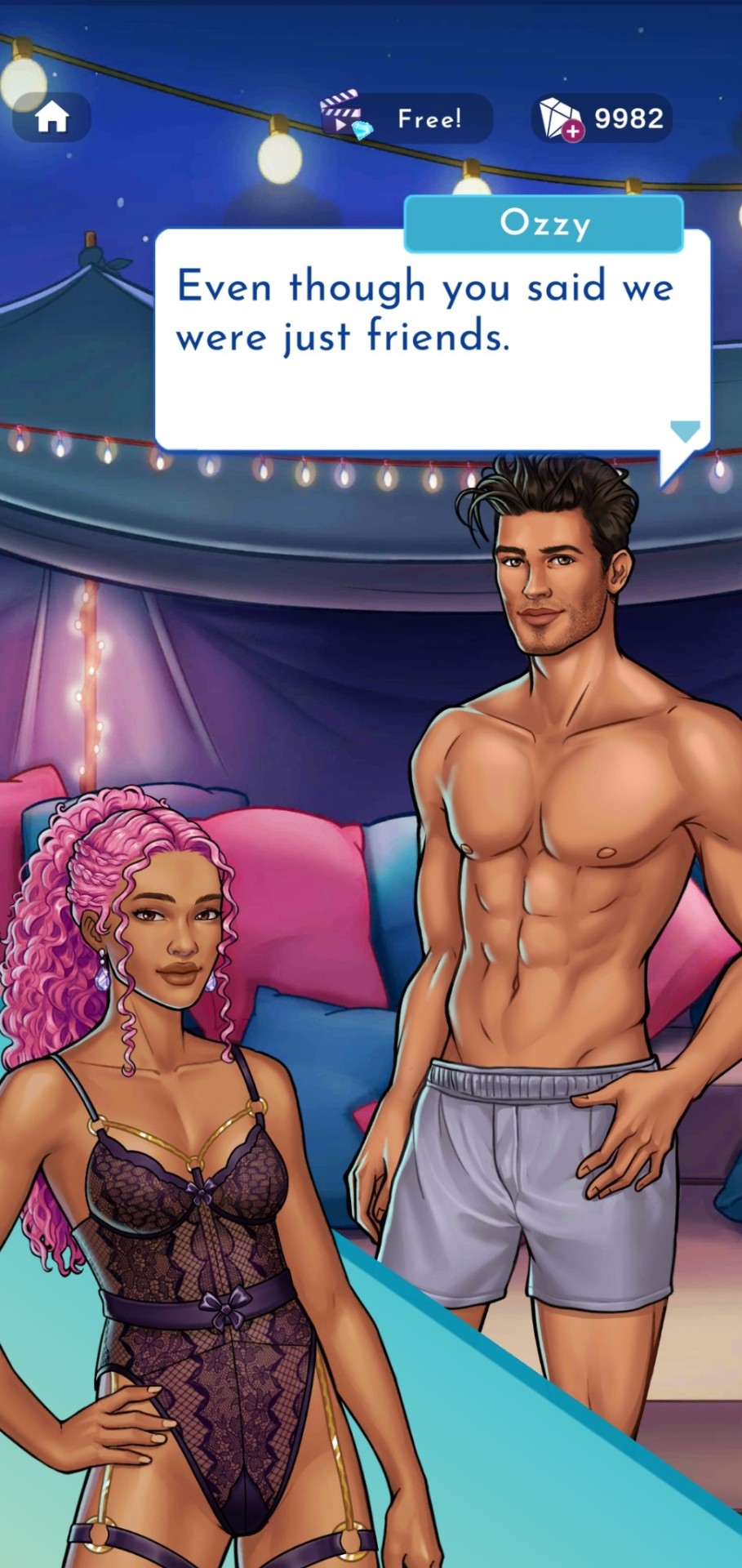

...from what I can tell from this difference of his dialog after the final recoupling.. he was reading the room, and was just trying to play it very cool with MC.
So, what is the overarching theme with Ozzy no matter how you approach his route? *checks the melted inked note on my arm* ..something about not knowing how to handle being in love for the first time, with the very real possibility of (total) rejection.
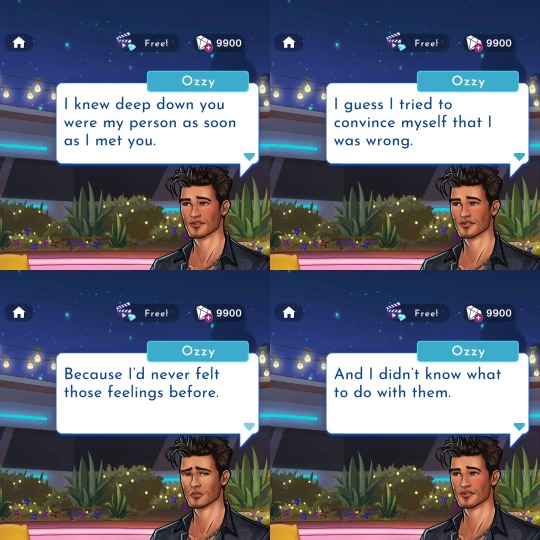
And, this song sums up his route to a T 🥺 and y'know what, maybe I did feel myself fall for him all over again as I was listening to it, on this last run 😭
#sorry for the redacted MC name djdhdsbhs‚ i wanna use her for fic writing and i'm not ready to reveal her name yet 🤭💜#i really love her and ozzy's dynamic 🥺#i'm chuffed to have an analysis post for ozzy finally 🥰💗#litg ozzy#litg s6#litg double trouble#litg#love island the game#my analyses
12 notes
·
View notes
Text
link click s2e01+02 eng dub thoughts
waiting for my friends to wake up for new link click ep so i'm watching the dubbed episodes and ??? holy, the death flash segment has such a different vibe.
well not SO different but yknow... I do hope they didn't write themselves into a corner here...
Dub: "I'm sorry… everything is going to be different now. death isn't something even one of us can change. the best we can do is accept it, so please don't let this be another burden for you to carry."
Sub: "It seems... everything is changing... If death cannot be avoided, then it might be better to face it now."
"don't let this become another burden" ???? ToT
Dub!LG was rly like "dude, speak faster- thERES SO MUCH MORE PAIN YOU CAN FIT IN HERE" dshjds-
Also I find the "even one of us can change" bit to be a little off-throwing. Maybe the emphasis is slightly wrong but I didn't process what he meant immediately upon first hearing it. Sounded more like "ONE of us" than "one of US" (i.e. ability).
alejandro's slight stutter when answering about the ability UGH GOLD
Little sad that the flow of red-eyes conversation isn't as good. usually the dub did great with convo flow, but here it seems a little jumpy. "if you dont know where to start, let's start with activation" -> "I can't quite figure it out" (then proceeds to explain how much they alr figured out adhsjds-)
Also the "i need to trust you again" depends heavily on the viewer knowing what red-eyes means there (i.e. the lie of no cops/the dark room plan).
ik that this is in the sub too, but the "but she sees right through you" is still a little weird to me and it's more obvious in dub i think. I thought that what this was going for was a sort of "you may be okay with fooling me, but fooling her (while i'm her) will end badly" kinda deal, but maybe I was wrong?
In the dub it just directly sounds like they mean they were only able to tell the lie because they're in QL's body and get some of her memories and feelings (like CXS does, maybe?) - but they actively paid attention to his shaking hands and everything, so I kind of don't think they relied purely on QL.
nooo they keep making red-eyes slightly different. from them assuming the photos and then confirming it through the "does he run here or teleport" moment, instead they just try... to stab her?? i guess?? and then they go "ohh i get it now" which... isn't a huge difference but kind of takes away from their smart thinking.
Going from the reaction -> "oh so I was right! How interesting!" (sub) to -> "teleporting with pictures, talk about a convenient power!"
STOP!! REMOVING!! THEIR THOUGHT PROCESS >:(
"why would I wanna hurt lu guang? he's family to me!" dub out here confirming the marriage, good for them good for them why would they do this to me
"you said the girl is innocent" -> "from what we saw it wasn't the girl" WHAT ABOUT THE BLOOD ALL OVER HER MADE YOU CONCLUDE THAT
Changing the part where CXS calls the murderer "the person who calls themselves my friend" (paraphrased) was a good call, bc that... sure was A Move.
Damn, dub just implied CXS wanted to perma-dive via "Two years... that is more than enough time. i could go back and change everything.". afaik we still don't know if the 12h restriction is bc of lu guang's rules or actually a restriction, so that is... certainly A Move, too. In Sub I felt like it was just desperate and he might have tried even with the 12h windows, but here it rly does sound like he'd just dive for longer? Unless I'm reading the dialog wrong...
"Sorry to disappoint" LOL ICONIC, slight adjustment but based.
"what's with the stuffed animal? not for me, i guess?" LMAO HELP ME-
"it's for my daughter, wise guy." PFFT
"and he's already a ghost. he doesn't even have social media. some might say he doesn't exist"
o... okay? does dub know more than we do dshjds-
"Breathe, damn it!!" pfft Captain Xiao is trying-
"is he the streetfighter master siwen talked about?" DUB WHAT ARE YOU DOING- i'm p sure this is just about the style, not the person ahhh-
"our backup's gonna be here soon" - "how funny, mine just arrived" While not what I've seen people translate this line as, still a good flow for this moment.
Aight. Some stumbles imo, but maybe they know more than we do and it'll all work out!
#link click#shiguang dailiren#link click s2#sgdlr s2#link click english dub#tori talks#tori has opinions
24 notes
·
View notes
Text
Oh shoot, I just realized that Kilmeny's climactic moment isn't actually in the next chapter. In my defense, her dialog is centered and bolded and several font sizes larger than the rest of the text, so it really looked like a chapter heading. Also narratively I was absolutely expecting it to be a new chapter.
Anyway, so Kilmeny doesn't just speak, she yells! And it is clearly understandable and complete sentences! I don't think this is how that works, but I will admit that I know nothing about adults who have had medical conditions that prevent them from speaking learning to talk. Maybe you are able to form words without issue if you grew up hearing and understanding the language. I do feel like at minimum she's going to have kind of an unusual accent. But again, this is a book where a woman is mute because her mother sinned against her own father, so I'm not sure it's terribly science based, you know?
So Kilmeny yells to warn Eric and Eric doesn't realize who yelled but looks behind him on instinct and sees Neil, who did see Kilmeny speak. Neil drops his axe in horror and runs away -- we assume that he knows that everything is lost for him now.
But we ignore him for a hug, because Kilmeny can speak now! End of chapter for real this time, and frankly not as good of one. Come on Maud, give me one cliffhanger!
Moving on to chapter 18 for real. Eric and Kilmeny run to tell the Gordons about the miracle that has happened. Only Eric hastens to assure us that it is not at all a miracle, David Baker had said such a thing might happen, it is all very scientific and explainable. Eric Marshall is going to move to fairland and run a steam train across it.
Thomas Gordon is having none of it though. It is a miracle and he's going to appreciate it as one. I wish we had gotten more of him -- he's one of the few characters who takes none of Eric's nonsense. Which I guess is why he doesn't get to talk on page much.
She spoke naturally and easily. The only difficulty which she seemed to experience was in the proper modulation of her voice. Occasionally she pitched it too high—again, too low. But it was evident that she would soon acquire perfect control of it. It was a beautiful voice—very clear and soft and musical.
Confirmation that Kilmeny does not have a noticeable accent. Sure. Fine. I'm with Thomas Gordon -- this makes much more sense if it's just magic.
Thomas asks what to do about Neil, and Eric, because he is a benevolent colonizer, says they must forgive him. Because Neil isn't an adult, who can be held accountable for his choices, he's half boy half wild animal and as such it's not his fault that he reacted accordingly to heartbreak. (I will note that I am paraphrasing here -- they don't quite say it like that. But it's the vibe.)
“That is true, Master, but it does not alter the terrible fact that the boy had murder in his heart,—that he would have killed you. An over-ruling Providence has saved him from the actual commission of the crime and brought good out of evil; but he is guilty in thought and purpose. And we have cared for him and instructed him as our own—with all his faults we have loved him! It is a hard thing, and I do not see what we are to do. We cannot act as if nothing had happened. We can never trust him again.”
I am going to strongly dispute the proclamation that the Gordons loved Neil. The only time they talk about him is to say bad things about him. Only Kilmeny ever had anything good to say. And, I was thinking back, and there is zero mention of him in any of the stories about Margaret's return and Kilmeny's childhood. Neil would have been four years old when Margaret came home after her marriage. A four year old child is going to be deeply impacted by the heightened emotions and tension in that house during those months of Margaret's silence. I think LMM just forgot about him, but what it conveys is that the Gordons forgot about him, or didn't care enough to mention him.
Neil was like their weird charity case kid that their dad insisted they keep. He doesn't seem to have been considered part of the family at any point except, again, by Kilmeny.
Conveniently, Neil has solved their problems by leaving town of his own initiative. Probably the smartest decision he has made all book, not going to lie. Eric learns this from Robert Williamson, who wants to know what on Earth has happened over at the Gordons. Eric tells him part of the truth -- that Neil scared Kilmeny greatly and in the process she gained her voice. And then Eric goes off to bed and Robert leaves us with this delightful line:
“Well, I never heard anything like this in all my born days—never—never. Timothy, did YOU ever hear the like? Them Gordons are an unaccountable lot and no mistake. They couldn’t act like other people if they tried. I must wake mother up and tell her about this, or I’ll never be able to sleep.”
11 notes
·
View notes
Note
Hiiiii I really love the quote in your bio. Can you explain it?
Symposium: meeting to discuss a subject and/or a banquet/drinking party with live entertainment (bc what other kind of entertainment would they have back then).
Also the title of one of Plato's dialogs, which explores Eros (the personification of love or literally the god of love and desire).
In this specific symposium, notable Athenian figures (Platos, Socrates, etc) delivered free-styled panegyrics (speeches glazing a person or thing) to Eros. So all these dudes are having a friendly debate on what Eros essentially is.
The quote is paraphrased from Plato's speech in his Symposium dialog, where he relays a story he was told by a woman called Diotima, in the book Wounded Heroes: Vulnerability as a Virtue in Ancient Greek Literature and Philosophy by Marina Berzins McCoy
If it interests you, I highly recommend reading the Symposium. Alternatively you could read chapter 5 of Wounded Heroes (but read the whole book if you can, it's pretty good) which has a nice breakdown of the whole thing. Or wikipedia for a skim.
My interest sparks from the story of Eros and Psyche and how that links to several of the arguments made in the Symposium in my personal analysis.
2 notes
·
View notes
Note
its been so funny seeing all the durandal/security officer fics on AO3 and other sites since mandalore's video
by god theyre making durandal such a babe
sorry, not one of those people. i started playing marathon because i found a floppy of it, and distantly knew there were ai in it. I didn't know about mandalore at all until ppl saw my interest in marathon, and started passing me his videos.
personally I think mandalore had little involvement in the ship itself, outside of funneling more players into the game itself. like, he glosses over all of durandal's flirting and paraphrases all his fun dialog. reducing him to his accomplishments, rather than his interactions with the player.
13 notes
·
View notes
Text
I finished Disco Elysium but something really Interesting happened right before I did.
I knew going to the island would essentially lock me into endgame so I wanted to complete as many tasks and checks as I could before I got to that point, and this included the mirror check and 'stop making the expression'. Ofc since it's free I'd been staying in the fishing village so I went into the shack and nailed the check unexpectedly. 'Something snaps and you stop making the expression' (I paraphrase but you get it. I come back out of the shack and Kim is *gone*
Like gone gone. I can't find him, his kimeena is gone, and I immediately start thinking 'oh christ alive has he been a hallucination this entire time??' So I start panic talking to everyone to see if a dialog option comes up about his disappearance and nothing. But I can't go to the island without him and he's mentioned in tasks and such so he must be somewhere, yknow?
Turns out it's a bug where he can disappear like he's gone for the day if you do exactly what I did. And it was only noon when he disappeared so I had to waste 9 hours so i could go to sleep and start the next day. (My roommates thought it would be really funny if there was an interaction in response to this bug occuring where you have to try not to cry when you find out Kim is real and he just ran an impromptu errand)
13 notes
·
View notes
Text
So I finally watched the new season (and four episodes of season two) of Total Drama, and I actually ended up liking it! Well, except for all the gross-out humor, but I’ve hated that aspect since the original series, so that’s not much of a surprise. Here, take some random thoughts:
I didn’t think I would like the character designs after seeing them floating around on my fyp a few times and my brain was like ‘old=good, new=bad’ and missed the old characters. But only an episode in I actually really started to like them and now I love basically every character design. Particularly Priya, Millie, Axel, and MK’s. They just make my brain happy for some reason.
Speaking of MK, I love her so much. She’s so cool and i hope either her or Axel wins season two, even though I don’t think that’s all too likely.
Speaking of MK again, I’m hard-core shipping her and Julia, please let them be girlfriends or at least have more awesome moments together I love them.
As previously mentioned, I hope Axel wins and therefore I like her a lot. She probably has my favorite character design, and she’s so badass. I wonder if the producers saw how Shawn was basically the only generally well-received character from Pahkitew besides Jasmine and so they brought back his zombie thing (and he’s an Easter egg during Axel’s intro). Since Shawn won Pahkitew, I doubt they’d let another Zombie-obsessed teen win the million, but hopefully I’m wrong.
The Axel and Ripper ship was…Unexpected, but I’m a huge multishipper who will ship basically anything as long as it’s not, like, incest or a ginormous age gap or something. So of course I think it’s pretty cute. It kinda came out of nowhere and I wish they would’ve shown Ripper realizing he likes Axel instead of him just suddenly stating that he does, but oh well.
Wayne constantly calling Raj ‘Raj-y’ all the time was such a cute dialog quirk to show how the two of them are close friends. Plus, Wayne being aggressively supportive of Raj coming out was my favorite thing ever.
Oh and Bowie and Raj’s relationship was adorable, obviously. That one moment where Raj says (talking about Bowie, paraphrased) ‘Yeah, he looks good…I MEAN he’s doing good! That’s what I said.’ Was so cute I loved it.
Julia secretly being evil wasn’t really too much of a twist for me, but it didn’t bother me that it was treated as one, since after an episode or two it’s just accepted that she’s pure evil, and she just gets worse and worse and honestly I can respect that.
I always thought All-Stars and especially Revenge of the Island felt rushed, or at least could’ve majorly benefited from having more episodes like the first three seasons, but strangely enough I think the pacing felt pretty good in this season’s 13 episodes. It felt like every character was actually explored properly but still had potential stored for the second season.
Speaking of potential, Caleb got voted out first in season one and so far I like what they’re doing with him in season two. He’s like Justin but less over-the-top and he actually seems pretty likable. I love how it’s not completely clear if Caleb knows if Priya has a crush on him or not, and while you’re inclined to assume he does and he’s just using her thanks to Alejandro and Justin’s legacy, he never says ‘oh, Priya’s into me and is easy to manipulate so I’m going to form an Alliance with her”. So I’m excited to see what happens with him.
Chase and Emma are a train wreck of a couple and I’m so glad season two started with them hating each other and ended with the two of them hating each other before they got voted off. I’m kinda sad to see Emma go so soon, though. Realistically, I think Priya would’ve gone home that challenge, since she made Emma pick the wrong answer during the challenge, but the writers need her around for the plot so Emma is voted off instead.
I think the writers didn’t know what to do with Chase and Emma now that they hate each other forever, so they just had them leave early and that’s kinda sad.
I was a little worried I wouldn’t like Bowie but after I made it through the first few episodes I quickly realized I actually really like him! He’s a ruthless player, but not over-the-top evil and I think that’s cool.
Scary Girl (Lauren) reminds me way too much of Veronika Grebenshikova oh my god. They have a similar fashion sense and personality. I really hope Scary Girl follows through on her threat to come back and make people pay or whatever, that would be very fun to watch. Also her efforts to become normal for a whole year only for people to vote her off for being creepy is weirdly very sad to me. She tried so hard to fit in and failed. But she did say she hid in their closets and stalked them, (was that true or was she kidding?), so I guess it makes sense everyone freaked out.
Chef is so…nice this season? I don’t know, but he seems a lot more caring for the campers. I’m not complaining, we kinda need someone to balance out Chris’s insanity.
I…Think that’s all? I might add more later, but for now that’s all I can think of.
8 notes
·
View notes
Text
So I was watching a musician react to a rock band (shout out to the warning), and the guy said something like "for you to have the right presence on stage, you need to overact and if you feel just borderline silly, you're at the right level" (paraphrasing) and it got ME THINKING
in totally unrelated application, what if the right level of entertainment in my writing might feel to me a little silly? what if I need to hit the threshold of overacting just a smidge in the dialogs hmm. I feel like I unlocked a complete new perspective in my brain
4 notes
·
View notes
Text
わけ - definition (2)
What does ~わけ mean?
The same post in much higher quality is here
In this #Japanese with anime post, we will take a closer look at a mind-bending structure belonging to the realm of modality and, unfortunately, is usually omitted in translation. It's not that it has to be omitted; it happens that English just sounds better or makes sense without it (in most cases).
Examples in this post are from Jujutsu Kaisen Season 1 and Season 2.
Extra grammar:
というわけ vs. わけ
わけ vs. から/ので
Before we dive in
わけ is truly a mind-bending structure, and knowing just the dictionary definition is not usually enough. The examples provided in textbooks seem to be okay at first glance, but when you start analyzing and comparing わけ to other structures and grammar points, you quickly realize that you haven't fully grasped the concept it actually represents.
Long story short, though. In a lot of cases, わけ can be translated to 'so' or 'then' (: as a necessary consequence; Merriam-Webster).
However, in many cases, English translations don't need to include 'so' or 'then' because things can be simply understood from the context. As readers, we don't need extra lexical help to understand that something is a consequence of something else. The brain fills in that information naturally on its own. Japanese, though, decided that having extra lexical help could be useful.
Note: This article doesn't explain the meaning of structures like わけにはいかない or わけではない. They do have their English equivalents.
I also managed to compile a short list of things that literally enlightened me while struggling to understand what わけ really means and why we need it to sound natural.
In many contexts, わけ indicates that the partners in the conversation share some knowledge.
You really need context to be able to use it. If you were to just enter a room and say a sentence containing わけ, it wouldn't make much sense.
It is used as a reaction/to react to someone else's statement (dialog) or to your surroundings. It shows that you have realized/understood something. Could be paired with だから, それで、なるほど, which are placed at the beginning and わけ at the end, for example:
だから、五条先生強いわけだ。
Ah, so that's why Gojo-sensei is so strong.
Context: We were wondering why Gojo is so strong, and we just found out (someone told us) that Gojo is a six-eye user, and that made us realize why he is so strong.
It is used when the speaker performs a monologue. In this case, we can distinguish two possible situations:
emphasizing inevitable consequences of some actions, i.e. You eat a lot of sugar, so naturally you will gain weight. If you don't add わけ to such a statement, it will be fine as well, but it will sound like a dry fact. However, during a lecture or a conversation about eating habits and their consequences adding わけ will give your sentence the nuance of "And as you know...".
the speaker wants to restate/sum up their own words because their first explanation was unclear. It's like saying "I mean..."; "In other words..."
It is used to restate/paraphrase someone else's words (or your own words). Could be paired with つまり. For example, someone described something to you, but it was complicated. You want to make sure you understand the statement correctly, so you paraphrase it using easier words. You will end that 'easier' sentence with わけ or というわけ.
Used to give the reason for what the conversation partner has said or to state the logical conclusion. Remember that both parties in the conversation need to have the same knowledge. For example:
「田中さんが亡くなったそうだ。」"
I have heard that Tanaka-san has died recently."
「本当?心臓発作だったというわけだな。」
"Really? That must have been a heart attack." (source)
Context: Both of the speakers knew that Tanaka-san had some heart problems, and one of them drew a logical conclusion.
わけではない is used for correcting false impressions
In English, the tone of your voice and intonation will change the meaning of your sentence. In Japanese, though, such changes can be expressed through particle/verb ending choice. A good example can also be ~てしまう.
Consider this sentence:
I didn't invite him to the party because I didn't like him.
It could mean either:
1. I don't want to party with people I don't like. (から)
2. I had other reasons not to invite him, and not liking him wasn't one of them (わけではない)
Even though there are ways to translate わけ into English, it's often omitted in translations.
'Because ' in English is used to provide reasons, but it doesn't really matter if your conversation partner shares knowledge with you. 'Because' can convey completely new information or information already known to everyone for clarity's sake. わけ, on the other hand, speakers must have some prior, common knowledge.
In the following parts of the article, you will find more information related to the above points.
Definition of ~わけ
According to Jisho, it is a noun, and because it is a noun you negate it as a noun, and it conveys the meaning of:
conclusion from reasoning,
judgment or calculation based on something read or heard;
or it just translates to (as a standalone word)
reason; cause; meaning; circumstances; situation.
Stefan Kaiser in his book Japanese: A Comprehensive Grammar defines わけ as
a structural noun [...] used when the speaker realizes that there is an explanation or reason for some occurrence or phenomenon. Or [...] used when the speaker realizes that some fact or occurrence is the result of some other fact or occurrence.
The author mentions that it can be translated to 'so' or 'then'.
Following this definition, let's analyze our first example from Jujutsu Kaisen.
JJK; S01 episode 02 or 03; Yuuji just moved into the school dorms
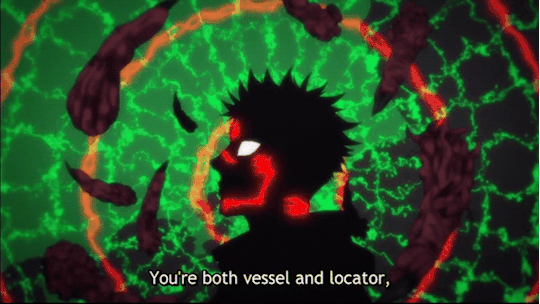
君の中の宿儺が力を取り戻すために指の在り処を教えてくれる. 君は器である同時に探知機、レーダーでもあるわけだ.
To regain its power, the Sukuna you consumed will direct you to the whereabouts of the fingers. You are a vessel as well as a radar.
To better understand this sentence, let's look at more context.
Yuuji has already eaten two of Sukuna's fingers. Since the fingers resonate with each other, he can kind of guess where they are or at least sense their presence (to some degree). Given those facts, we can surmise that Yuuji works like a radar, and that is what Gojo implies by using わけ.
In essence, わけ marks a logical conclusion or result based on some known facts.
Some known facts: Yuuji ate the fingers, they resonate with each other, and he's a vessel...
The conclusion from reasoning/realization: ...you’re a radar.
Notice that the English translation did not include any phrase that would introduce 'conclusion'. It is implied. You could include, for example, 'And that's why...' or something along those lines, but the whole line sounds better without it.
Let's elaborate on it, though. For those of you who don't overthink life or grammar rules, such short dictionary entries might be enough, but I'm a professional overthinker and I just need to know.
~わけ as a modal structure
This section is full of proper linguistic discourse, but don't shy away from it. It might actually help you deepen your understanding of this structure. Japanese grammar books for teachers, and grammar books written in Japanese, list わけ as a modal structure.
For a complete guide to modality, go here ⇒ Link Click
Modality is about a speaker’s or a writer’s attitude towards the world. A speaker or writer can express certainty, possibility, willingness, obligation, necessity and ability by using modal words and expressions. Speakers often have different opinions about the same thing. (Cambridge online dictionary)
Simply put, modal structures help you convey a variety of subjective nuances, for example, instead of saying, I'm wrong, you can say, I might be wrong (might is a modal verb). Let's see what subjective feelings わけ helps us convey:
Certainty or Conviction: わけ is often used when the speaker is confident or certain about the reason they are presenting. It signals that the speaker believes something is true based on their understanding or recognition of a situation.
Explanatory or Justificatory: It is commonly used to explain or justify a statement or action. It adds a sense of "it makes sense that..." or "therefore..." to the statement, showing that the speaker is not just stating a reason but also expressing their conviction or perspective on that reason.
Subjective Interpretation: わけ reflects the speaker's subjective interpretation or understanding of a situation, making it a modal structure because it conveys the speaker's attitude and belief.
An interesting observation has been made in an article titled 「わけだ」文と「からだ」文の意味の違いについて by 牟世鍾 and 宋洙珍 (I'm sorry, I can't decipher their names).
「わけだ」文が表す理由は、対象から納得し、それを理由として位置づけたもの、つまり、話し手が何か認識の過程を経て位置づけたまさにモダリティの形式であり、そのような認識․納得の過程のない直接的な理由を表す「からだ」文とは異なっている。
Which roughly translates to:
The reason expressed by the sentence わけだ is that the speaker is convinced by the object and positions it as the reason, that is, it is the very form of modality that the speaker positions through some recognition process, which is different from the sentence からだ, which expresses direct reasons without such a recognition/convincing process. (translation: mine)
In summary, the passage explains that わけだ places emphasis on the speaker's mental activity by which they become aware of, identify, and understand something (recognition). It involves perceiving, acknowledging, and comprehending information or stimuli in a way that leads to an understanding or recognition of a particular fact, concept, or situation. からだ, on the other hand, is more direct and simply states the reason without highlighting the speaker's internal thought process.
The article also states that
納得の形で提示した理由の文、つまり「わけだ」文は「からだ」文に置き換えられるが、その「からだ」文は「わけだ」文が持っているモダリティ的な意味はなく、単なる理由を表す文になってしまう。
Which translates to:
The statement of reason presented as a form of belief, i.e., the わけだ statement, can be replaced by the からだ statement, but this からだ statement does not have the modality meaning of the わけだ statement and becomes a mere statement of reason.
"A mere statement of reason" refers to a straightforward and explicit connection between the cause and reason; there's no room for confusion or subjective interpretations. Modality, though, is all about subjective interpretations.
For example, in the sentence "I'm late because of traffic," "because of traffic" directly links the cause (traffic) to the effect (being late), making it clear that traffic is the reason for being late. There is a straightforward connection between the two elements.
Okay, let's leave modality and that linguistic talk and move on to something lighter. However, continue reading this article to find out what is the best possible interpretation of Gojo's わけ.
A learner-friendly definition of わけ
After many talks with my Japanese teacher, we managed to pinpoint some reasons for using this structure and what speakers want to convey by using it. Our main goal was to determine why in some cases わけ is a much better option than から.
Let's go back to our Jujutsu Kaisen example:
君の中の宿儺が力を取り戻すために指の在り処を教えてくれる. 君は器である同時に探知機、レーダーでもあるわけだ.
To regain its power, the Sukuna you consumed will direct you to the whereabouts of the fingers. You are a vessel as well as a radar. (official translation)
In this case, and as you will see in other examples, わけ most likely conveys:
general/obvious statement. It means that all parties involved in the conversation share the same knowledge and the speaker just confirms everyone's understanding.
the speaker indirectly (through わけ ) asks "You understand, right?" / "You know what that means, right?"
Gojo realizes that Yuuji has enough information to understand his situation, but may or may not know the implications. Yuuji may not know/be sure what all of this means.
Gojo first provided Yuuji with a result and then he stated the reason why achieving this result will be possible. This can also give わけ the meaning of "So no wonder why you work like a radar."
In essence, わけ is used when there is shared knowledge about the situation and the speaker reinforces/confirms everyone's understanding, even when not prompted to do so.
If we replace わけ with から, we will end up with a sentence conveying completely new information to Yuuji. The context of this sentence would have to be different as well.
The original context involves Gojo walking Yuuji around the school and talking to him about the jujutsu world and Yuuji's position in all of this. Yuuji did not ask any questions during their walk, as some things had been explained to him before.
However, if Yuuji was oblivious to his situation and what having eaten the fingers meant for him and the jujutsu world, Gojo would have to provide him with some dry explanations/facts.
The important factor here is 'being oblivious/not knowing enough'.
Let's replace わけ with から then.
[...] 君は器である同時に探知機、レーダーでもあるから。
To regain its power the Sukuna you consumed will direct you to the whereabouts of the fingers. Because you are a vessel, a locator as well as a radar.
In English, it still might make sense, but as I mentioned at the very beginning, わけ is often omitted in translation. In translation, we call such cases 'problems with equivalence', which means that one language has something that the other doesn't have or doesn't use it as often as the first one.
If Gojo used から, it would imply that Yuuji didn't know that he was a vessel, that the fingers resonate with each other, and therefore he could be of help to everyone.
The exchange between them could look like this:
Gojo: In order to regain its power the Sukuna you consumed will direct you to the whereabouts of the fingers.
Yuuji:Why? / How come?
Gojo: Because you are a vessel, a locator as well as a radar.
Let's analyze another example from Jujutsu Kaisen.
Nobara just joined the team; S01; Ep03
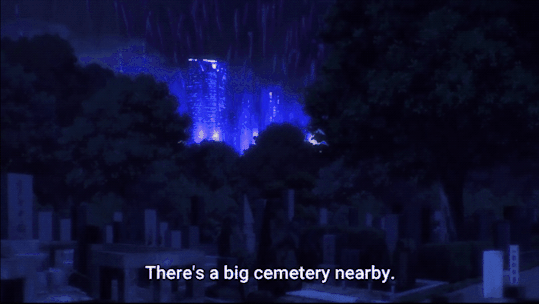
でかい霊園があってさ、廃ビルとのダブルパンチで呪いが発生したってわけ
There is a big cemetery, and the double whammy with the abandoned building caused the curse.
(again, no English equivalent of わけ)
というわけだ / ってわけだ are just more elaborate ways to express logical conclusions. It's often used with な-adj and nouns. There's a separate section on that, too.
In this case, Gojo gave our main trio two reasons why the curse might have shown up in the abandoned building. The building and the nearby graveyard are those reasons.
If we were to explain the use of わけ here in linguistic terms, we could say that わけ is used to emphasize that the occurrence of the curse is the logical result of the combination of two factors: the large cemetery and the abandoned building. It suggests that there's a logical connection between these two elements that led to the curse. It also adds a sense of logical inevitability.
However, explaining it through our 'learner-friendly definition' we could say that Gojo used it because:
all of them share the same knowledge, namely they all know why curses are born and what the combo of an abandoned building and a graveyard means (general/obvious statement).
It's not like they pulled up to the building oblivious to the world around them, and Gojo had to teach them the basics. Even though they did not ask any questions, he was confirming their understanding of the situation through わけ.
Gojo through わけ also implies something along the lines of "And as you can see..." or "As you probably already realized..."
It could also be the case that they immediately realized that the curse was there, but they didn't know why/weren't sure why. Gojo did not waste time, and instead of waiting for their questions, he supplied the missing information himself.
If we modified the sentence with から, it would still indicate that the curse occurred because of the combination of the large cemetery and the abandoned building. However, it would imply that the main trio didn't know that the connection between the curse being there and the vicinity of the graveyard and abandoned building mattered.
The conversation could go like this:
Gojo: There's a curse in this building.
Them: Why?
Gojo: There is a big cemetery, and the double whammy with the abandoned building caused the curse.
One more example from Season 1, Episode 2.
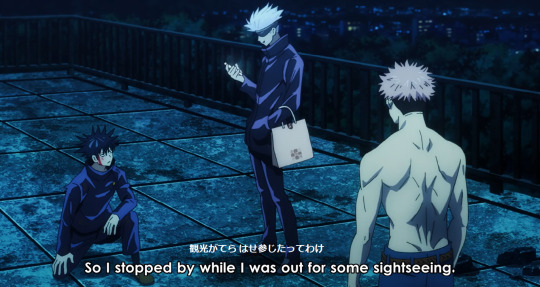
さすがに特級呪物が行方不明となると―上がうるさくてねえ 観光がてら はせ参じたってわけ
As one would expect when a special-grade cursed object goes missing, the higher-ups won't shut up, so I stopped by while I was out for some sightseeing.
In this case, 'so' perfectly captures the meaning of わけ, as Stefan Kaiser pointed out in his book.
A missing special grade cursed object is a big deal and sorcerers shouldn't take such cases lightly, which Gojo points out to Fushiguro, namely "[...] the higher-ups won't shut up."
Both Gojo and Fushiguro know about it as they belong to this community, which means they share knowledge.
While Gojo is telling Fushiguro why he came, he isn't providing him with new information. In this case, わけ has the nuance of "So you probably realize why I am here."
Because they belong to the same community, Fishuguro understands that ignoring special-grade cursed objects isn't the best of actions, and Gojo just reinforces/confirms his understanding.
One example from Season 2, Episode 8
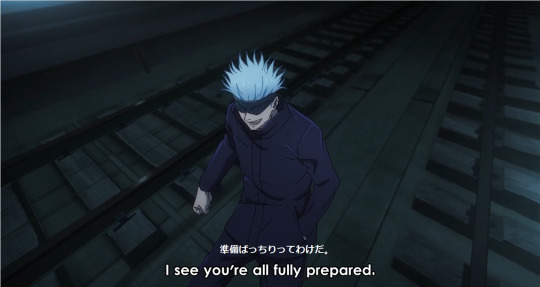
準備ばっちりってわけだ。
The presence of わけ in this example might not be so clear at first glance. However, the English translations official and unofficial alike somehow manage to capture the meaning of わけ through "I see," which by many learners is instinctively translated to なるほど, though.
As always, we need more context.
Gojo since entering the Shibuya station began to collect information about the situation. He noticed some things that helped him understand/realize what was going on, namely his opponents (Jogo, Hanami, and Choso) prepared for the fight with him.
Through わけ, Gojo shows his realization. At the beginning of this article, I mentioned that わけ can be used as a reaction to someone else's statement. In this case, Gojo is not reacting to someone else's words, but to his surroundings.
In an alternate situation, Jogo or Hanami could also tell him: "Hey! We did this and that!" And Gojo could reply with: "Is that so? It means that you prepared yourself then" (drawing a logical conclusion/natural consequence).
So let's summarize what we have learned about わけ so far.
わけ is a modal structure, which means that the statements marked by it aren't facts but opinions/beliefs/thoughts.
It can be used interchangeably with から, but the nuance changes, and in some cases the meaning.
It marks logical conclusions, which by nature aren't hard facts.
It can also be used to give advice or make general statements based on a logical conclusion.
というわけだ is a more formal and elaborate way to provide a conclusion because there are more reasons stated and this helps us summarize everything.
わけ is used to explain the reason or cause behind something. It helps clarify why a certain situation occurred or why someone did something.
It is often used to provide an explanation or justification.
All parties involved in the conversation share some knowledge / have the same information.
You can't really use it without context, as opposed to から, which can be used without any context.
It conveys the nuance of "As you probably already realized..." or indirectly asks, "You understand, don't you?"
というわけだ / ってわけだ for restating some facts
Apart from というわけだ / ってわけだ being a "more elaborate way to mark logical conclusions", it can also be defined as a structure that paraphrases someone else's or your own words.
わけだ and というわけだ don't really change the meaning of the sentence, but というわけだ is used when the speaker provides more than one reason for something. It is often used with な-adjectives and nouns as opposed to わけだ, which is often seen after verbs. It's not a hard rule, though.
What does paraphrasing mean and why do we do that?
Paraphrasing means that you're trying to use your own words to show how you understand someone's statement. You have analyzed someone's statement and you drew a conclusion.
We do it because we are not sure of our understanding; in a way, we're asking our speaker to confirm our understanding. Modal meaning applies here as well.
In the previous examples, Gojo wasn't restating someone else's words. He was the one to introduce the information.
However, in the example below, Principal Yaga is restating Yuuji's reasons for joining the jujutsu world.
The interview with Yaga; S01; Ep02
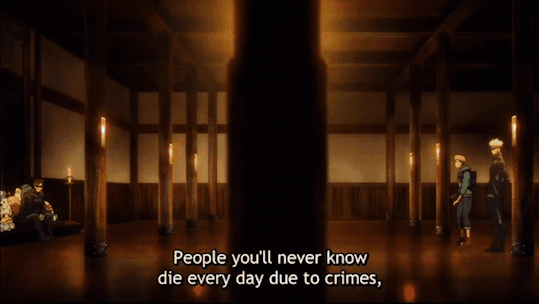
それが呪いの被害となると看過できないというわけか
Yaga just asked Yuuji why he wanted to join the jujutsu high school. Yuuji told him that leaving Sukuna's fingers as they are (unprotected/unsupervised) is dangerous. Yaga drew a conclusion from that, namely:
JJK; Chapter 3; Viz Media

In this case, we actually have something that is considered the equivalent of というわけだ namely, "So you're telling me that [...]". However, remember that not every "so you're telling me that..." needs to be translated to というわけだ.
In the very first chapter, the very first thing Fushiguro says to Gojo is, "You're telling me that someone is keeping a special-grade cursed object in a place like this?!" Fushiguro wasn't restating/paraphrasing Gojo's words.
We can assume that before this panel Gojo told Fushiguro: "There's a special-grade cursed object in the outdoor thermometer box." Fushiguro saw it and just repeated Gojo's words in disbelief, it was sort of a quotation.
Translation problems
In the above examples, わけ could be translated to 'so' or 'then,' but the aim of translation is to make sentences in the target language sound as natural as possible. We could rephrase all of them and include 'so' or 'then' or even any other synonyms, but if the context is clear enough, then including extra lexical help is simply redundant.
Here, we're also dealing with audiovisual translation, where the number of characters in a single line of subtitles matters a lot. Too many words in a single line may hinder the understanding or slow it down and lower the overall experience. And yes, even such short words as 'so' can do it.
Sources
https://briefjapanese.fun/how-to-use-wake/
my Japanese teacher and his native Japanese teacher
Stefan Kaiser, Japanese: A Comprehensive Grammar (p.285)
7 notes
·
View notes